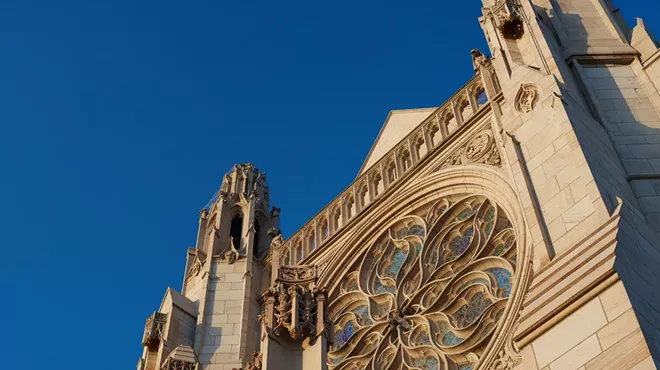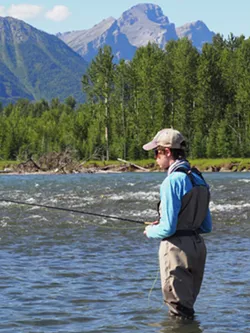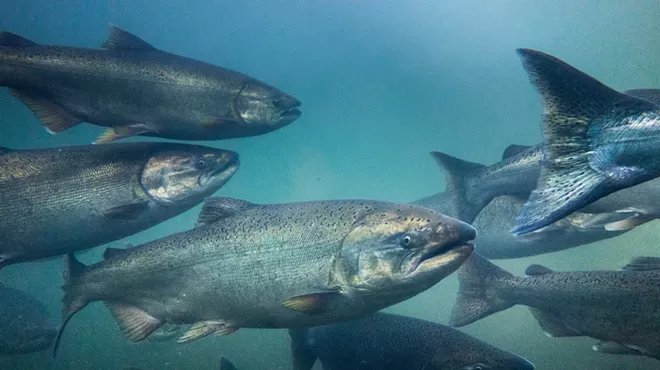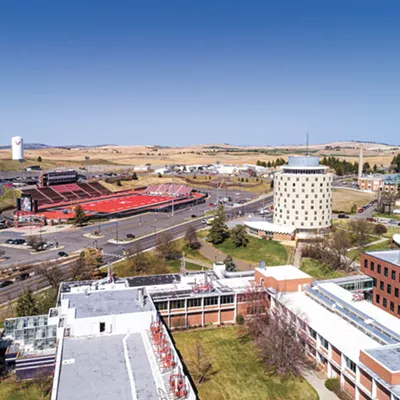Like many during the pandemic, the Busse family visited Glacier National Park in summer 2021 to get outdoors and enjoy the wild, mountainous area that's practically in their backyard. Although 14-year-old Badge Busse and his 17-year-old brother, Lander Busse, live with their parents Ryan and Sara in Kalispell, Montana, less than an hour from the majestic west entrance to Glacier, Badge says his family doesn't visit the park often.
On that visit, Badge says he knew it could be the last time he'd see the park's dwindling glaciers in person.
When one of the eighth grader's teachers later "said just nonchalantly that our glaciers in Glacier National Park are going to be gone and our children won't be able to get to see them," it was one of the only times he recalls climate change impacts being talked about in school. The issue, he says, has unfortunately been considered too political and so hasn't come up much in lessons.
REPRESENTING NATURE'S VOICELESS
As participants call on Spokane County to help tackle climate change locally, this year's Earth Day Climate March in downtown Spokane will have a special focus on plants and animals impacted by the crisis. Starting around 1:45 pm Friday, April 22, musicians will draw people toward the Pavilion in Riverfront Park, where speeches are scheduled to start at 2 pm. Among the scheduled speakers are Washington state Department of Commerce Director Lisa Brown and a handful of young local environmentalists.
By around 3 pm, the crowd will be invited to line up and march through downtown. Those who show up dressed as animals or plants will be asked to lead the way in a "Gathering of the Species" modeled somewhat after "Procession of the Species" events that have gained popularity on the west side of the state.
"[We're] really trying to give voice to the voiceless. It's not just humans who are going to be affected by our changing climate," says Trenton Miller, one of the event organizers. "Unless you're an ant or cockroach, there's a good chance that whatever species you dress as, if not endangered now, may be in the future."
The event is being organized by the Spokane Climate Coalition, which includes environmental groups such as 350 Spokane, Sunrise Spokane, and regional university environmental clubs. Participants who want to dress up for the march are encouraged to repurpose old costumes and materials they already have, or upcycle items they get secondhand in order to create their animalistic looks.
After marching through downtown, the group will return to the Pavilion, where environmental groups will have booths to provide more information for those who want to get involved.
The groups are planning to make a formal call to action by asking Spokane County to hire a staff member to focus on sustainability at the county level.
While it's hard to pinpoint just when the glaciers will recede enough to no longer be considered glaciers when winter snow builds up on the mountains, scientists say the end is nigh. There were 80 or so glaciers in 1850, but by 2015, the park had just about two dozen glaciers left, some of which had shrunken by more than 80 percent since they were measured in the 1960s, according to the National Park Service.
"In actuality it wasn't new information for me. I know that most of the things that I have right now, like fly fishing or stuff like that, it's gonna be gone, and it sucks to think about," Badge says. "Honestly, it scares me, but my whole life has just been building up to this, so like none of this is new. This has always been happening; it's always been in the back of my head."
The idea that he could start a family one day and not be able to share the beauty of Montana with them is scary to him.
"I really like to ski, and I'm on the freestyle team here, and I want real snow," Badge says. "I really would like to have kids in the future, and I want them to be able to ski and share what I like to do, and I feel like that's just, like, almost impossible now."
That's partly why Badge and Lander joined with 14 other young Montanans in 2020 to file a lawsuit against their own state. Their complaint? The Montana Constitution guarantees their right to a clean environment, but the state's actions, they allege, have perpetuated climate change and negatively impacted their lives, particularly through supporting fossil fuel extraction and burning.
By February 2023, the 16 youths will become the first children in the nation to be able to take their major climate change case to trial, building off the work of previous litigation and potentially paving the way for people around the country to force changes in policy where lawmakers have failed to do so.
"I think being involved in a lawsuit can be very empowering for them and make it feel like they have a voice and can make a difference in the world and protect their futures when they can't vote," says Nate Bellinger, senior staff attorney at Our Children's Trust, an organization helping represent the youth plaintiffs pro bono. "Any impact we could have to start to reduce those fossil fuel projects and emissions would be significant for Montana, but a win in this case would also set an important legal precedent that would resonate beyond Montana, and really across the world."
IT'S LITERALLY THEIR RIGHT
One of the unique reasons for starting a climate change case in Montana is that residents have long shown a special respect for the many lakes, rivers, mountains and open prairielands that make it a beautiful place to live.The massive "Big Sky" state (we're talking a place almost as big as Washington and Idaho combined, and more than 2.6 times the size of New York state) has a wealth of natural resources, enabling ranching and timber practices, as well as coal, oil and gas extraction.
But in recent years, young people there have faced wildfires that are getting larger and more frequent as a result of human actions, including forestry practices and a rapidly changing climate. They've seen their rivers get hotter and run slower in the summer, and snow melt faster and more erratically, causing flooding in spring. They've experienced physical health impacts, such as asthma and allergies, and mental health impacts from the stress and despair that come from thinking about the future and the potential loss of places that are important to them.
Even if human-caused greenhouse gas emissions completely stopped tomorrow, their impact would be felt for many years as those heat-trapping gases stay in the atmosphere for a long time.
So, it made sense to the youths, who now range in age from 4 to 20, and their families to bring a case to protect their environment in March 2020.
After all, the right to a clean environment is guaranteed to them. The forward-thinking people of Montana put it right there in the state constitution. It was so important, in fact, that of all the rights considered "inalienable," they led with the environment.
"All persons are born free and have certain inalienable rights," states Article II, Section 3 of the Montana Constitution. "They include the right to a clean and healthful environment and the rights of pursuing life's basic necessities, enjoying and defending their lives and liberties, acquiring, possessing and protecting property, and seeking their safety, health and happiness in all lawful ways. In enjoying these rights, all persons recognize corresponding responsibilities."
The state's constitution, adopted in 1972 and replacing Montana's original 1889 founding document, also requires the state and Legislature to maintain and improve the environment for future generations, and prevent its degradation.
In their lawsuit, Held et al v. State of Montana, the young plaintiffs call on the state of Montana to stop supporting fossil fuel projects that contribute to climate change and to remediate the harms already caused by intentionally ignoring the impacts that projects may have on the climate.
"Instead of using governmental authority to exacerbate the existing dangers and risks of harm to these children, Defendants must use their existing authorities to take science-backed actions to reduce their risk of harm," the lawsuit argues.
Bellinger, who is representing the young plaintiffs along with attorneys from the Western Environmental Law Center and McGarvey Law in Kalispell, says the state is also a significant contributor to climate change.
"Montana has vast quantities of coal, much of it already being extracted," Bellinger says, "and pretty significant quantities of oil and gas, and they are moving full speed ahead with extracting those fossil fuels as well as burning them in state and exporting them out of state as well."
The lawsuit specifically calls out two state policies: the State Energy Policy, which explicitly promotes fossil fuels, and the Montana Environmental Policy Act, or MEPA, which is the state's local version of the National Environmental Policy Act. Notably, Montana lawmakers specifically codified that regional, national or global impacts could not be considered when state agencies are considering whether to permit projects that require an environmental impact statement under MEPA.
By exempting climate change impacts from that state decision-making process and authorizing fossil fuel production and consumption, the state defendants "are unconstitutionally depleting and degrading Montana's environment and natural resources and causing and contributing to the dangerous destabilization of the climate system, thereby depriving the Youth Plaintiffs of their constitutionally guaranteed rights," the lawsuit argues.
"I don't want to feel like my time is running out. I don't want to go fly fishing and think, 'Oh, this could be my last time at this lake.'"
THE STAKES
Each youth plaintiff has unique reasons for participating in the case. Rikki Held, the lead plaintiff who was 18 at the time the case was filed, lives in southeastern Montana, where her family raises cattle and grows crops.Her family's ranch has faced several hardships influenced by climate change in recent years. The lawsuit states that the Powder River, which runs through their ranch, dried up completely one year, and the snowpack has become less reliable, making it harder for them to water their cattle; wildfires cut their power for a month one year after destroying local infrastructure; and wildfire smoke there has caused some of the worst air quality in the country, requiring Held and her family to remain indoors.
Lander and Badge Busse both hunt and fish with their parents. They have seen flows too low to enable fishing, and hunting seasons impacted by overwhelming heat and changes to animal migration.
"I want to save these places," Badge tells the Inlander. "I don't want to feel like my time is running out. I don't want to go fly fishing and think, 'Oh, this could be my last time at this lake.'"
The Busses also experienced a wildfire in 2018 that came so close to their home they had to prepare to evacuate. While their home was spared, the boys worry that future fire seasons could put them at risk again.
Sariel S., who was 17 at the time of filing, lives on the Flathead Indian Reservation and is a member of the Confederated Salish and Kootenai tribes. Access to bison, huckleberries and other resources her family relies on has diminished. (Plaintiffs who were minors at the time of filing and who did not speak with the Inlander are identified as in the lawsuit, by first name and last initial).
"The threat of losing her community's important connection to the environment and losing her culture because of climate change is extremely stressful on Sariel and her community," the lawsuit states.
Kian Tanner, now 17, tells the Inlander his sports seasons have been severely affected, as wildfire smoke prevents or delays soccer games, and he and classmates have to remain indoors more frequently. He's also no longer able to access fly fishing as often due to warmer rivers and lower flows, and his family has had to cancel trips due to wildfire smoke.
Georgianna F., 17 at filing, is a competitive Nordic skier who has seen warmer winters impact the ability to get out on the trails, and wildfire smoke shorten her summer training season.
Kathryn Grace S., who was 16 when the case was filed, has seen the Clark Fork River get too low to float or kayak on in the summer, and dangerously high due to rapid snowmelt in the spring. Climate impacts give her so much anxiety that she's not sure she wants to have children, and is "fearful that her generation may not survive the climate crisis," the lawsuit states.
Eva L., who was 14 at filing, lives near Yellowstone National Park. As someone who likes to camp, climb, ride bikes and float rivers, she's suffered health impacts from wildfire smoke that made it hard to breathe. Devastating flooding from rapid spring snowmelt took out the bridge her family used to get to town. The next year the same thing happened with the temporary bridge replacement, causing her family to take a 45-minute detour each day, and ultimately forcing them to move.
Mica K., who was 11 at filing, has seen recess get canceled for weeks on end due to wildfire smoke, which gives him headaches and fatigue. He fears for the future of his favorite animal, the fluffy pika, which resides in the mountains.
Olivia V., who was 16 at filing, has exercise-induced asthma, which makes her especially prone to the risks of wildfire smoke. She's had to leave Montana in recent summers when the smoke was too bad, and experiences bouts of depression while thinking about the future.
Jeffrey and Nathaniel K., who were 6 and 2 at the time of filing, both suffer from respiratory issues and can't play outside when it is smoky, due to the risk of an emergency room visit.
Claire V., who was 17 when the case was filed, helped raise $120,000 to put solar panels on her middle school, and has seen her ability to work as a ski instructor at Big Sky Resort impacted when there's little snow and few visitors.
Ruby and Lilian D., who were 11 and 9 when the case was filed, are members of the Crow Tribe. Weather and fires have impacted their ability to participate in traditional events at powwows. Ruby has asthma made worse by smoke.
Taleah H., who was 16 at filing, has seen glaciers dwindle in Glacier National Park and worries how diseases could impact bison as rising temperatures make viruses more transmissible. Hurricane Maria, one of the worst natural disasters the U.S. has ever seen, impacted her ability to visit relatives in Puerto Rico.
Each young plaintiff has already seen climate impacts and many fear what the future may hold if changes aren't made.
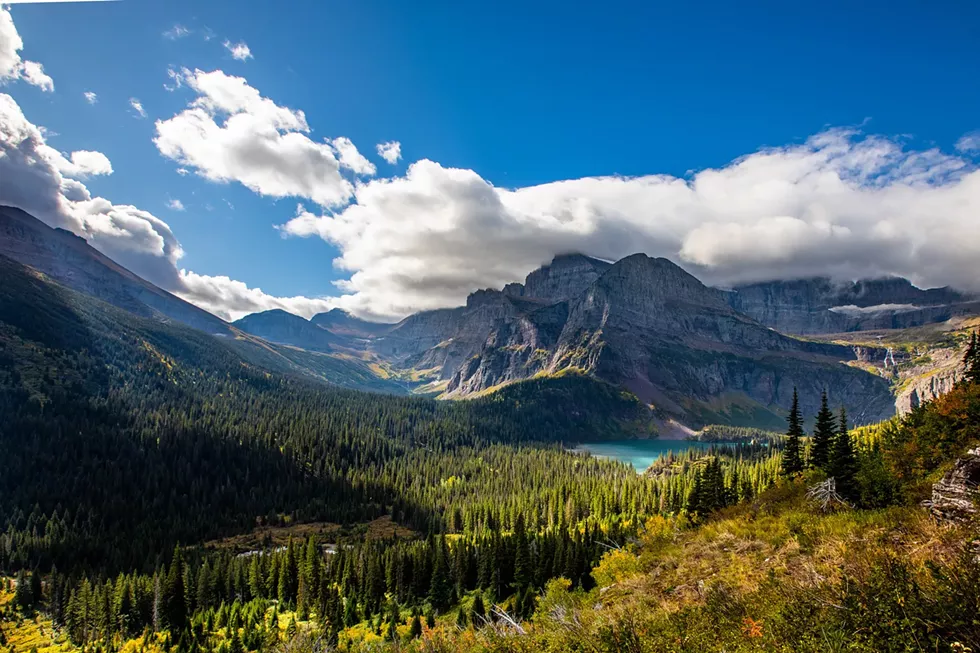
BUILDING ON OTHER BATTLES
While this youth climate case may be the first in the country to actually go to trial, many similar cases have been filed over the past decade, with similar groups of young people trying to hold their government accountable.Perhaps the most famous is Juliana v. United States, another case spearheaded by Our Children's Trust that has tried to press the issue at a national level since 2015. In Juliana, the plaintiffs asked the courts to weigh in on the constitutional protections owed to youth around the country for their rights to life, liberty and property, and how the actions of the U.S. may have violated those rights by significantly contributing to climate change.
Should the courts find that their constitutional rights have been violated, the youth plaintiffs specifically called on the courts to require the government to stop permitting and subsidizing fossil fuels, and create a plan of action to draw down emissions. But the separation of powers prevents courts from creating political policy. The youth plaintiffs in that case are now waiting to learn if they'll be allowed to amend their demands, and whether 18 states will be allowed to intervene to fight against them.
Other cases have also been left in limbo or required young people to request state agencies take action through other means.
In Aji. P v. State of Washington (February 2018), 13 youths alleged Washington had violated their rights to life, liberty and property through fossil fuel policy. A King County judge dismissed the case, telling them to use the political process and be optimistic. The Court of Appeals upheld the motion to dismiss and the state Supreme Court declined to hear the case. The plaintiffs' lawyers are considering their next steps.
In Sagoonick v. State of Alaska (October 2017), 16 young Alaskans alleged Alaska's fossil fuel policies had contributed to the state's "climate crisis, placing youth plaintiffs in danger and harming their health, safety, homes, culture, and Native villages in violation of Alaska's Constitution." In January 2022, the state's Supreme Court denied their right to bring the constitutional case, and in February the court denied their petition for rehearing. Their lawyers are considering next steps.
In Reynolds v. State of Florida (April 2018), eight youths alleged that state fossil fuel policies that contributed to climate change had violated their rights to life, liberty, property and the pursuit of happiness. The courts dismissed the case, saying it asked judges to rule on a political matter, violating the separation of powers. In January 2022, the youths filed a petition for rulemaking that asks the state to create a policy to reach 100 percent renewable energy by 2050.
The Montana case is different in multiple ways.
First, the young plaintiffs are specifically alleging the violation of their state constitutional rights to a clean environment.
Second, while Montana First Judicial District Judge Kathy Seeley agreed with the state defendants that, similar to Juliana, the courts would not be able to order a specific action plan to reduce greenhouse gas emissions, she also found that a ruling in the plaintiffs' favor could still redress the harms done to them.
Because the youths alleged that Montana's State Energy Policy and climate change exception in MEPA violated their constitutional rights, if the court declares those things unconstitutional, "this, 'by itself [would] suffice to establish redressability, regardless of whether additional injunctive relief was issued,'" Seeley's August 2021 order states.
Essentially, if the state policies are unconstitutional, the youths will be able to change the way the state makes decisions on projects that impact climate change.
"It could help affirm we have three branches of government, and the courts need to make sure they're doing their job to review the conduct of the legislative branches and make sure they're acting in a constitutional manner," plaintiff attorney Bellinger tells the Inlander. "They may declare the actions unconstitutional, and then if necessary, order injunctive relief. So, they could order the state to bring its conduct into constitutional compliance."
For example, that could mean halting the permitting of new fossil fuel projects, he says.
Some of the Montana plaintiffs like Lander Busse hope that the case will enable people to put aside political differences, because climate change impacts everyone.
"Changing how the law looks at climate change is a really good way to change how people look at climate change."
"I feel like a lot more Montanans, though they may not think they agree with this overly politicized issue, when you look at the intricacies of how larger corporations are infringing on these things that are built into our constitution, it becomes a lot more of a bipartisan thing," Lander says. "Nationwide, we're entitled to this, and everyone else should have a right to fight for it as well."
Fellow plaintiff Kian Tanner tells the Inlander he got inspired to join the case to make a difference with climate change legally, since his focus previously was on changing people's minds. It can be challenging to talk about climate change where he lives in the Flathead Valley and get people to actually listen, he says.
"Changing how the law looks at climate change is a really good way to change how people look at climate change," Tanner says. "The main thing I want people to know about this case is that we have a chance for the first time in history to actually make a change to legislation, from, like, a plaintiff's perspective. We have yet to have a successful case, and I think this case can be the first successful case and lead to change throughout the country and hopefully change throughout the world." ♦



